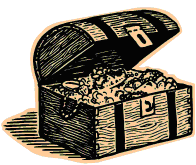Player Ratings
You'll notice as you play our games that some of the games provide a player rating. The rating is a number between 0 and 1200 that allows you to compare your ability level with the general population of players at The Problem Site. To understand your rating, you should keep the following key numbers in mind:
- 1000: If you have a rating of 1000, you are an "average" player. Above 1000 means you are above average.
- 1200: This is the maximum possible rating, which is attained by the very best player on the site.
Your rating will fluctuate based not just on your games, but also on the games of other players.
A Friendly Caution
It might be tempting to think, "If I'm having a bad game, I'll just quit the game, and that way it won't count against me." That's actually not true. When you start a game, a zero score is added to your tally, and when the game is finished, the zero is replaced with your actual score. In other words, if you give up on games to protect your rating, you will end up hurting it instead!
The Mathematics of Player Ratings
For those who are interested in how the ratings are calculated, that information can be found below.
Step One: The Raw Rating
Let's say you played Diamond Slide 9 times, and obtained the following scores: 105, 220, 225, 240, 250, 275, 275, 310, 315.
The site will do a bit of quick statistical analysis on these numbers to find outliers. Outliers are numbers which are outside a reasonable range from the central grouping of values - they could either be exceedingly high or exceedingly low. In the case of our example, the only outlier is 105, which is significantly lower than the main grouping of values.
The site removes the outlier, leaving the following set of numbers: 220, 225, 240, 250, 275, 275, 310, 315. These values are averaged, resulting in 229.375. This number is your raw rating.
Step Two: The Normalized Rating
At this point, your don't have a very useful number. After all, if you were playing Adders or Trio Match, the number would be significantly higher, because the scoring systems in those two games allow for much higher scores than Diamond Slide. In addition, the number doesn't tell you anything about how you are doing relative to other players.
So what do we do next? We look up all the raw ratings for the game, and calculate two values:
- T: The top rating
- A: The average rating
We now want to pass all the raw ratings through a linear function that maps A to 1000 and T to 1200. This will normalize all the raw data into useful values. The function is:
r(x) = mx+b, where m = 200/(T - A), and b = 1200 - 200T/(T - A)
Note that even when you aren't playing, your rating will change. Your raw rating will remain unchanged, but every time someone plays a game, T and A are recalculated, and your normalized rating is updated.

